Related Research Articles

The Jammu and Kashmir National Conference (JKNC) is a regional political party in Indian-administered Kashmir's union territories of Jammu and Kashmir and Ladakh. Founded as the All Jammu and Kashmir Muslim Conference by Sheikh Abdullah and Chaudhry Ghulam Abbas in 1932 in the princely state of Jammu and Kashmir, the organisation renamed itself to "National Conference" in 1939 in order to represent all the people of the state. It supported the accession of the princely state to India in 1947. Prior to that, in 1941, a group led by Ghulam Abbas broke off from the National Conference and revived the old Muslim Conference. The revived Muslim Conference supported the accession of the princely state to Pakistan and led the movement for Azad Kashmir.
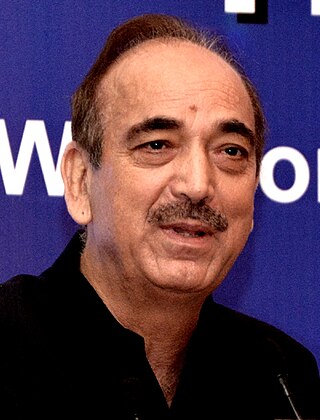
Ghulam Nabi Azad is an Indian politician who served as Leader of Opposition in Rajya Sabha between 2014 and 2021. He also served as the Chief Minister of erstwhile state of Jammu and Kashmir from 2005 to 2008. On 26 September 2022, Azad announced his own political party as Democratic Progressive Azad Party. He is the chief patron cum founder of Democratic Progressive Azad Party.
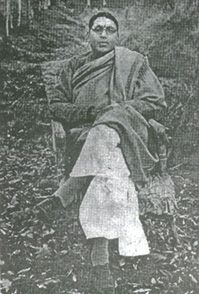
Kashyap Bandhu was a political leader and social reformer in Kashmir.
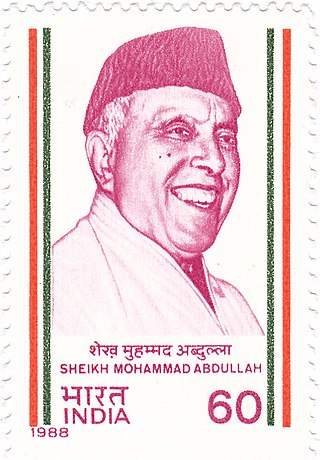
Sheikh Mohammad Abdullah was a Kashmiri politician who played a central role in the politics of Jammu and Kashmir. Abdullah was the founding leader of the All Jammu and Kashmir Muslim Conference and the 1st elected Prime Minister of Jammu and Kashmir after its accession to India. He agitated against the rule of the Maharaja Hari Singh and urged self-rule for Kashmir.
The following is a timeline of the Kashmir conflict, a territorial conflict between India, Pakistan and, to a lesser degree, China. India and Pakistan have been involved in four wars and several border skirmishes over the issue.

Jammu and Kashmir is administered by the Republic of India within the framework of a federal parliamentary republic as a union territory, like the union territory of Puducherry, with a multi-party democratic system of governance. Until 2019, it was governed as a state administered by India. Politics in the region reflects the historical tension and dispute that the state has been a part of in the form of the Kashmir conflict. The head of state is the Lieutenant Governor of Jammu and Kashmir, currently Manoj Sinha, while the head of government is the Chief Minister of Jammu and Kashmir, currently vacant. Legislative power is vested in the Legislative Assembly of Jammu and Kashmir, although this was dissolved by the Governor on 21 November 2018. The judiciary is independent of the executive and the legislature.
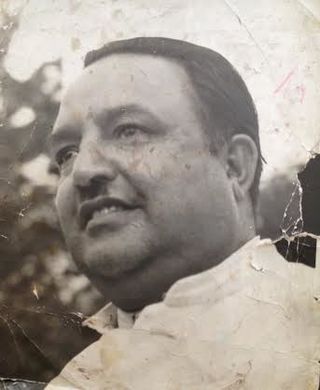
Mirza Afzal Beg widely known as Fakhr-e-Kashmir (1908–1982) was a Kashmiri politician and the founding member of Jammu & Kashmir National Conference. He was the first Deputy Chief Minister of Jammu and Kashmir. He was member of the Constituent Assembly of India. He served as a minister in the pre-independence period in the princely state of Jammu and Kashmir, and as the revenue minister in the post-independence government headed by Sheikh Abdullah. In this post he led the land reforms in Jammu and Kashmir, recognised as the most successful land reforms in India.
The Kashmiri diaspora refers to Kashmiris who have migrated out of the Kashmir into other areas and countries, and their descendants.
The Jammu and Kashmir People's Conference is a political party in Jammu and Kashmir, India, founded by Abdul Ghani Lone and Molvi Iftikhar Hussain Ansari in 1978. It is currently led by Sajjad Lone. It won two seats in the Jammu and Kashmir Legislative Assembly in the 2014 elections.
Girdhari Lal was an Indian politician from Jammu and Kashmir, belonging to the National Conference and later the Indian National Congress. He was a member of the Jammu and Kashmir Legislative Assembly, and served as Finance minister of the state for 26 years. He was also a member of the Lok Sabha, elected from the Jammu–Poonch constituencey and the Udhampur constituency. He was known as "The People’s man".
The Jammu Praja Parishad was a political party active in the Jammu Division of the Indian-administered Jammu and Kashmir. It was founded in November 1947 by the Rashtriya Swayamsevak Sangh activist Balraj Madhok, and served as the main opposition party in the state. It maintained close ties with Bharatiya Jana Sangh during its lifetime and merged with the latter in 1963. Its main activity was to campaign for the close integration of Jammu and Kashmir with India and oppose the special status granted to the state under the Article 370 of the Indian constitution. After its merger with the Bharatiya Jana Sangh, the precursor of the present day Bharatiya Janata Party, the party gradually rose in stature. As an integral part of the Bharatiya Janata Party, it was a partner in the ruling coalition led by the People's Democratic Party.

After the Partition of India, during October–November 1947 in the Jammu region of the princely state of Jammu and Kashmir, many Muslims were massacred and others driven away to West Punjab. The killings were carried out by extremist Hindus and Sikhs, aided and abetted by the forces of Maharaja Hari Singh. The activists of the Rashtriya Swayamsevak Sangh (RSS) played a key role in planning and executing the riots. An estimated 20,000–100,000 Muslims were massacred. Subsequently, many non-Muslims were massacred by Pakistani tribesmen, in the Mirpur region of today's Pakistani administered Kashmir, and also in the Rajouri area of Jammu division.

A widespread agitation throughout the princely state of Jammu and Kashmir in British Raj occurred in 1931 against the Maharaja's government. The Maharaja was forced to appoint the Glancy Commission to investigate the people's concerns. Various political reforms were adopted including the introduction of the Jammu and Kashmir Praja Sabha. The movement also saw the rise of Sheikh Muhammad Abdullah as the leader of Kashmiris. The movement was funded by some well-to-do Muslim Zaildars and business houses.
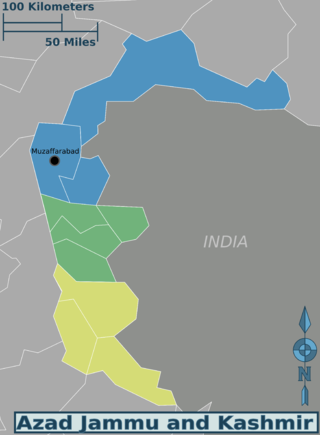
In spring 1947, an uprising against the Maharaja Hari Singh of Jammu and Kashmir broke out in the Poonch jagir, an area bordering the Rawalpindi district of West Punjab and the Hazara district of the North-West Frontier Province in the future Pakistan. It was driven by grievances such as high taxes, the Maharaja's neglect of World War veterans, and above all, Muslim nationalism with a desire to join Pakistan. The leader of the rebellion, Sardar Muhammad Ibrahim Khan, escaped to Lahore by the end of August 1947 and persuaded the Pakistani authorities to back the rebellion. In addition to the backing, Prime Minister Liaquat Ali Khan authorised an invasion of the state, by the ex-Indian National Army personnel in the south and a force led by Major Khurshid Anwar in the north. These invasions eventually led to the First Kashmir War fought between India and Pakistan, and the formation of Azad Kashmir provisional government. The Poonch jagir has since been divided across Azad Kashmir, administered by Pakistan and the state of Jammu and Kashmir, administered by India.
The following is a timeline of the Kashmir conflict during the period 1846–1946.
Under Dogra rule, people in the princely state of Jammu and Kashmir launched several political movements. Despite ideological differences and varying goals they aimed to improve the status of Muslims in a state ruled by a Hindu dynasty.
Mirwaiz Muhammad Yusuf Shah was a religious leader and politician in the princely state of Jammu and Kashmir during the British Raj. He served as the Imam of the Jama Masjid in Srinagar, a position that is also known as the "Mirwaiz of Kashmir". He relegated the majority of his political career to opposing the Jammu & Kashmir National Conference of Sheikh Abdullah, including siding with Pakistan during the First Kashmir War. He moved to Azad Kashmir and eventually served as the president of Azad Kashmir.
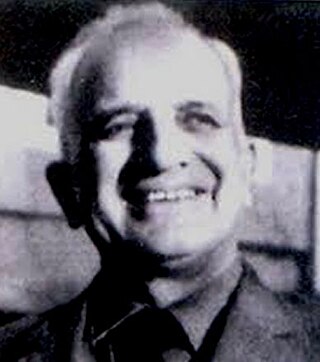
Prem Nath Bazaz was a Kashmiri politician, scholar, and author born in Mattan, Kashmir. He was a secularist and a democrat. He was born to a Kashmiri Hindu family. He was a Kashmiri politician who founded two political parties, Kashmir Socialist Party, and Kisan Mazdoor Conference. He was the architect of the famous slogan "Kashmir belongs to Kashmiris", and was an ardent supporter of the Kashmir freedom movement till the end. He has authored several books with Kashmir as the central theme. Some of these books include:
The first election for a legislative assembly called Praja Sabha was held in 1934 in the princely state of Jammu and Kashmir in the British Indian Empire. The Praja Sabha was to have 75 members, of which 12 would be officials, 33 elected members and 30 nominated members. The election was held on 3 September 1934. The All Jammu and Kashmir Muslim Conference under the leadership of Sheikh Abdullah was the largest elected party with 16 seats won. A 'Liberal Group' championed by the Dogra Sadar Sabha had the overall majority in the Assembly with 24 members.
References
- ↑ Ravinderjit Kaur, Political Awakening in Kashmir 1996, p. 40, 41.
- ↑ Ravinderjit Kaur, Political Awakening in Kashmir 1996, p. 43.
- ↑ Luv Puri, Across the Line of Control 2013, p. 16.
- ↑ Rekha Chowdhary, Politics of Identity and Separatism 2015, p. 10-13.
- ↑ Parashar, Kashmir and the Freedom Movement 2004, p. 142.
- ↑ Rekha Chowdhary, Politics of Identity and Separatism 2015, p. 13.
- ↑ Balraj Puri, The Question of Accession 2010, p. 4.
- ↑ Puri, Balraj (8 December 1984), "An Iconoclast Hindu (Review of Ahead of His Times: Prem Nath Bazaz, His Life and Work by Nagin Bazaz", Economic and Political Weekly , 19 (49): 2075–2076, JSTOR 4373847